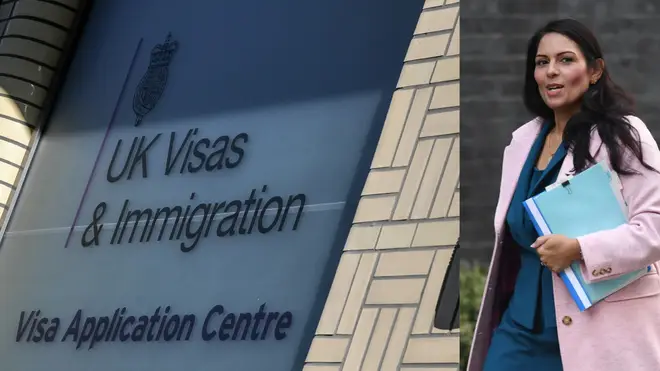
Henry Riley 7pm - 10pm
19 February 2020, 05:31

Boris Johnson's plans for post-Brexit immigration will need so many exemptions it will be "meaningless", Labour has claimed.
Home Secretary Priti Patel will later launch a new points-based immigration system which is designed to "open up the UK to the brightest and the best from around the world."
Speaking to LBC's Nick Ferrari ahead of the launch Ms Patel said the system would allow the government to "clearly take back control of our borders" meaning the first time in decades the British government would be able to run their own immigration system.
The Government came under fire for telling employers they will "need to adjust" after deciding it will not offer visas to low-skilled migrant workers after Brexit.
But industry leaders have suggested the Tory changes to rules could "spell absolute disaster" for the care system and risk farmers, builders and hospitality businesses being hit the hardest.
Shadow home secretary Diane Abbott criticised the plan, which seeks to lower the salary threshold for skilled migrants from £30,000 to £25,600 for those coming to the UK with a job offer.
A statement detailing Boris Johnson's plans for a 'points-based system' to be introduced once freedom of movement ends said the economy needs to move away from a reliance on "cheap labour from Europe".

The changes, outlined in the Conservative Party election manifesto, are designed to slash the number of low-skilled migrants entering Britain from the beginning of next year but aim to make it easier for higher-skilled workers to get UK visas.
Priti Patel branded the launch a "historic move" for Britain, she said: “Today is a historic moment for the whole country.
“We’re ending free movement, taking back control of our borders and delivering on the people’s priorities by introducing a new UK points-based immigration system, which will bring overall migration numbers down.
“We will attract the brightest and the best from around the globe, boosting the economy and our communities, and unleash this country’s full potential.”
In line with the Government’s manifesto commitment, there will be no specific route for low-skilled workers. It is estimated 70% of the existing EU workforce would not meet the requirements of the skilled worker route, which will help to bring overall numbers down in future.
Unison assistant general secretary Christina McAnea said the plans "spell absolute disaster for the care sector".
Dame Donna Kinnair, chief executive and general secretary of the Royal College of Nursing, raised concerns that the proposals will "not meet the health and care needs of the population".
The UK Homecare Association said it was "dismayed" by the Government's decision, adding: "Cutting off the supply of prospective careworkers under a new migration system will pave the way for more people waiting unnecessarily in hospital or going without care.
"Telling employers to adjust, in a grossly underfunded care system, is simply irresponsible."
National Farmers' Union president Minette Batters expressed "serious concerns" about the Government's "failure to recognise British food and farming's needs" in the proposals.
Labour's Diane Abbott branded the announcement a "meaningless Government soundbite," she said: "This isn't an 'Australian points-based system', which is a meaningless Government soundbite. It's a salary threshold system, which will need to have so many exemptions, for the NHS, for social care and many parts of the private sector, that it will be meaningless.
"Ultimately, it will also be very difficult to attract the workers we need at all skill levels while the Tories' hostile environment is in place. It needs to go."
Liberal Democrat home affairs spokeswoman Christine Jardine said the proposals were based on "xenophobia" and not the "social and economic needs of our country".
"Too many businesses are already struggling to hire the workers they need, and now the Tories want to stop them recruiting all but the highest-paid employees from abroad," she said.
The EU Settlement Scheme, designed to give EU citizens permission to stay and work in the UK after Brexit, will "provide employers with flexibility to meet labour market demands", the paper said.
Expanding a seasonal workers scheme and arrangements with eight countries to welcome young people to the UK will also help employers but they are expected to take "other measures to address shortages", the paper said.
The document added: "We recognise that these proposals represent significant change for employers in the UK and we will deliver a comprehensive programme of communication and engagement in the coming months.
"We will keep labour market data under careful scrutiny to monitor any pressures in key sectors."
Employers have until January 1, 2021, to meet the requirements and ensure their staff have a right to work in the UK.
The plans will see the UK have "full control over who comes to this country" for the "first time in decades", according to the paper.
EU and non-EU citizens will be treated equally with criminal background checks carried out on everyone coming to the UK - affecting applications of anyone who has been given a prison sentence of 12 months or more.
People who want to live and work in the UK will need to gain 70 points to be eligible to apply for a visa.
Points will be awarded for key requirements like being able to speak English to a certain level, having a job offer from an approved employer, and meeting a minimum salary threshold.
"Top priority" will be given to those with "the highest skills and the greatest talents", like scientists, engineers and academics - who may not need a job offer to be allowed in.
Other points will be awarded for certain qualifications and if there is a shortage in a particular occupation.